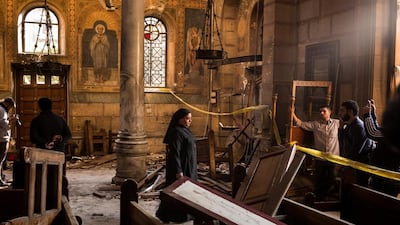Renewed discussions about the need to revisit traditional religious texts that extremists use to justify their practices came to the fore this month after the bombing of a Coptic church in Egypt and the immolation of two Turkish soldiers. The complexity of the effort was typified by a two-hour television debate last week between a cleric and a controversial scholar.
Islam Al Behery, an Egyptian, is widely dismissed by traditionalists for his lack of formal training under religious teachers. Many also criticise him for what they see as a disrespectful way of speaking about revered figures in Islamic history. But his debate with Dr Saad Eldin Helaly, a professor of comparative jurisprudence at Al Azhar, captures the ambivalence some have towards the oldest Sunni learning centre.
On one hand, Al Azhar has established itself as a counterweight to religious and political extremism throughout its modern history. Across the globe, its graduates battle extremism and provide an authentic, pluralistic and moderate form of Islam. At the same time, the establishment has also served as gate keepers against those advocating a more radical and systematic review of archaic texts that extremists still use to justify their ideologies. So, Al Azhar fights on two fronts – against extremism and open scrutiny – and thus presents a solution and a problem.
A major question of the debate on December 19 was the bombing of the Coptic church. During the discussion, Dr Helaly admits that three of the four Sunni schools of jurisprudence contradict the Quran on whether a Muslim who kills a Christian should be punished. All the four schools agree that the killing of an innocent Christian, or any human for that matter, is forbidden, as the Quran unequivocally stipulates. But only one of the schools allows for punitive retribution against a Muslim who kills a Christian.
I was reminded of a court case in Abu Dhabi on which The National reported around this time in 2010. The Court of Cassation rejected the ruling in which two lower courts had sentenced a killer to 15 years in prison, instead of the death penalty, because he was a Muslim and the victim was not. The highest court ordered the case to be tried under the Hanafi school, the only one that calls for the death penalty in such a case, rather than the official Maliki school.
Dr Helaly acknowledged that three of the most authoritative figures in Islamic history made a mistake. He insisted, however, that it was a legitimate human error that did not warrant a full review of traditional texts. For Mr Al Behery, the existence of such an error means that a jihadist who does not recognise Egypt’s state laws can rest assured that he does not deserve a punishment in this world. And if there is a fatwa permitting him to target those deemed “crusaders”, he would even expect a reward in the hereafter.
The failure to criticise and tackle such opinions head on is also relevant to the immolation of the Turkish soldiers on Friday. The video was not accompanied by a religious justification for immolation as happened when ISIL burnt alive Muath Al Kasasbeh, a Jordanian pilot, in February last year. If that suggests one thing, it is that the group did not even bother to present one because Muslim clergy had failed to respond adequately to the religious justification that ISIL provided the first time.
What struck me about the case of the immolation is that it is unequivocally forbidden by Prophet Mohammed. In a hadith, he says: “No one punishes with fire except the Lord of the fire.” A brief search shows that established clerics ruled against the punishment.
ISIL can cite the stories of the Prophet’s companions and clerics condemn the group’s act but stop there. The companions are considered religious authorities to be emulated. The clerics’ failure was not that they failed to condemn the act. Their condemnation of ISIL would mean little if the sources it used to justify murder remain immune from scrutiny.
Shortly before the murder of Kasasbeh, Jordan’s King Abdullah had called on Muslim leaders to take ownership of the fight against ISIL through a pan-regional strategy to counter extremism. Almost two years later, another immolation of fellow Muslims at the hands of a group that seemingly did not deem it necessary to repeat itself is an indictment of religious clerics. With the passage of time and the failure to tackle such old texts, which often contradict the Quran and the Prophet, such practices will become far more widespread and extremists could build on them to justify other acts.
Much of the reluctance by clerics to go after the sources emanates from a fear that criticism will undermine the integrity of those they consider to be pillars of their religious authority. Al Azhar, to be fair, has sought to ease Muslims’ integration in the modern world. It has sanctioned practices that fundamentalists consider un-Islamic. This put Al Azhar at odds with rigid religious movements. And for that, it deserves support. On the flip side, it will continue to play the role of a gatekeeper that resists the overhaul of texts that sustain the very movements it seeks to tackle.
Hassan Hassan is a resident fellow at the Tahrir Institute for Middle East Policy and co-author of ISIS: Inside the Army of Terror
On Twitter: @hxhassan

